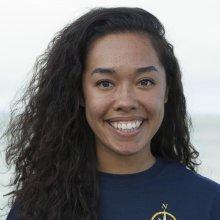
Carina Fish
Tell us about your work / research. What kinds of things do you do?
I am fascinated by how humans are impacting the ocean, and particularly, below the surface waters. As a marine biogeochemist, I track human-induced changes to the deep sea by looking at the chemical composition of coral skeletons, their food source, and the water itself. Corals record in their skeletons the environment in which they grew. With increased atmospheric carbon dioxide emissions from human activities, the ocean becomes more acidic, which affects the ability of corals to build their skeletons. Corals are important as their skeletons form habitat for other species, and they are thus the foundation of their ecosystem. While we have studied the effects of ocean acidification on the surface ocean, its effects - and that of climate change in general - on the deep ocean remains largely unknown. To rectify this, my research will quantify the perturbation of ocean acidification to the deep ocean by investigating deep sea corals and oceanic parameters like pH.
What sparked your initial interest in your career?
At the impressionable age of 15, I spent three months at a semester abroad school in The Bahamas where the hands-on marine science had a lasting effect. In college, the awesome field trips that came par for the course with studying Earth and Planetary Sciences lured me to declare it as my concentration. I developed an interest in geochemistry thanks to a really approachable professor who had funding for students to join him at sea for 5 weeks. After college, I was able to merge my initial interest in the marine sciences with the tools and techniques of geochemistry as a research staff assistant for a professor in paleoceanography in NYC, which solidified my passion for marine geochemical research.
Who influenced you or encouraged you the most?
My public high school offered a marine sciences class that both my older sister and brother raved about thanks to an incredible teacher. I was lucky to not only take his class but also be made aware of the semester abroad school and encouraged to apply thanks to him. For college, I am grateful to my primary thesis advisor who was integral in helping me develop my senior thesis summer research into the passion I have for carbonate chemistry today.
What element of your work / study do you think is the most fascinating?
I love expanding people's perception of corals when I tell them I work on corals right off the coast of SF. I've spent a large portion of my summer aboard ships in the bay area, so it's also nice to go under the golden gate bridge and see it from a different perspective. In between sampling stations, my downtime is filled with whale watching, birding, and seeing the occasional acrobatics of pinnipeds.
What other jobs led you to your current career?
I worked as a divemaster for a while in Southeast Asia, but while I loved being in the water, I missed the intellectual rigor of research. However, starting out as a research assistant, I acid-washed my fair share of bottles, pipette tips, and vials; cleaned wet labs and lots of field gear; and sieved, weighed, and prepped many samples for other scientists. Originally, I was more chemistry and material sciences focused working on soft robotics before retooling to study rocks with high-temperature geochemistry. I eventually turned down the heat and transitioned over to biogeochemistry. Prior to studying deep sea corals, I've dove shallow-water coral reefs for a belt transect study and have gone blue-water diving while tethered to a trapeze in order to collect and culture a type of plankton.
What are your degrees and certifications?
Artium baccalaureus in Earth and Planetary Sciences + Environmental Science and Engineering -- Harvard College 2013; Divemaster
What are your hobbies?
I love to go swing dancing and play in recreational sports leagues. I enjoy backpacking, scuba diving, and distance running. I like to explore new places through eating.
What advice would you give to someone who wants to have a career like yours?
If you want to pursue doctoral work in marine biogeochemistry, or more broadly, the earth sciences, I highly recommend mastering the fundamentals. Don't feel pressured to specialize so soon! My peers who concentrated in mathematics or physics for their undergraduate degrees and then pivoted to the earth sciences for their senior thesis research or graduate work later were able to pick up biology, ecology, geochemistry and the like with considerable ease. The more core-subject approach allows one to be more flexible in choosing his/her study system and toolset for research. You can still gain significant earth science research experience by supplementing your coursework with summer programs like any of the many Research Experiences for Undergraduate (REUs) or by working as a research assistant for your favorite professor during the school year. Lastly, be sure to call or meet with graduate students and professors whose areas are of interest to you. Some of the best advice I received in my graduate school search was to prioritize two of the three "P"s: project, place, and principal investigator.
How did you get involved with the Nautilus Exploration Program? How did you get on the ship?
I've developed my dissertation work to align with several goals of Cordell Bank National Marine Sanctuary science objectives. By partnering with CBNMS, I was invited to join this leg of the Nautilus cruise thanks to CBNMS' research coordinator.
Expeditions
Carina participated in the following Ocean Exploration Trust expeditions:
